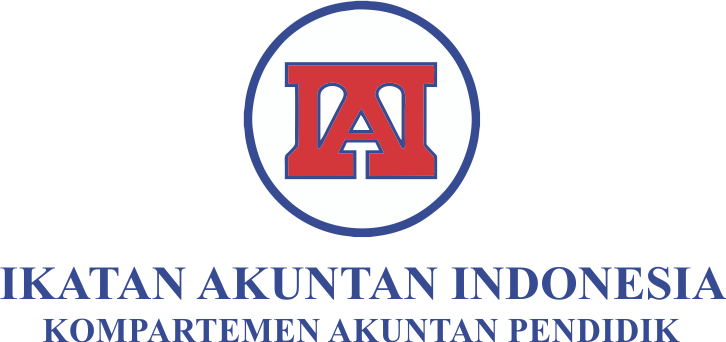Analisis dan Dampak Perilaku Keuangan Terhadap Tekanan Finansial Mahasiswa
Abstract
Riset ini bertujuan untuk menganalisis peran dari perilaku keuangan didalam memediasi kualitas pembelajaran Akuntansi dan Keuangan serta self-efficacy terhadap tekanan finansial yang dirasakan mahasiswa. Teknik pengambilan sampel yang digunakan di dalam penelitian ini yakni purposive sampling dimana sampel yang dituju adalah mahasiswa Fakultas Ekonomi dan Bisnis yang telah memperoleh edukasi mengenai keuangan dan akuntansi di daerah Jakarta dan sekitarnya. Total sampel yang diperoleh sejumlah 375 responden. Analisis data di dalam riset ini menggunakan pendekatan Structural Equation Modelling menggunakan software smartPLS, yang terdiri dari pengujian measurement dan structural model. Adapun diperoleh hasil bahwa perilaku keuangan tidak berpengaruh terhadap tekanan finansial. Aspek perilaku keuangan terbukti tidak memiliki peran di dalam memediasi hubungan kualitas pembelajaran Akuntansi dan Keuangan serta self-efficacy terhadap tekanan finansial. Sementara dari sisi hasil pengujian efek langsung diperoleh hasil bahwa kualitas pembelajaran dan financial self-efficacy terbukti signifikan terhadap perilaku keuangan dan tekanan finansial.
Kata Kunci: Kualitas Pembelajaran Akuntansi dan Keuangan; Financial Self Efficacy; Perilaku Keuangan; Tekanan Finansial
Keywords
Full Text:
PDF (Bahasa Indonesia)References
Amonhaemanon, D. (2023). Financial stress and gambling motivation: the importance of financial literacy. Review of Behavioral Finance. https://doi.org/10.1108/RBF-01-2023-0026
Anggraini, F., & Mulyani, E. (2022). Pengaruh Informasi Akuntansi, Persepsi Risiko dan Citra Perusahaan dalam Pengambilan Keputusan Investasi di Masa Pandemi Covid-19. Jurnal Eksplorasi Akuntansi, 4(1), 25–39. https://doi.org/10.24036/jea.v4i1.486
Arofah, A. A. (2019). Financial Literacy, Self-Efficacy, and Financial Behaviour of College Students International Journal of Pedagogy and Teacher Education (IJPTE). International Journal of Pedagogy and Teacher Education (IJPTE), 3(2). https://doi.org/10.20961/ijpte.v3i2.17546
Asia Regional Integration Center. (2022). Asian Economic Integration Report. https://aric.adb.org/database/fsi
Aydin, A. E., & Akben Selcuk, E. (2019). An investigation of financial literacy, money ethics and time preferences among college students: A structural equation model. International Journal of Bank Marketing, 37(3), 880–900. https://doi.org/10.1108/IJBM-05-2018-0120
Coram, P., Potter, B., & Soderstrom, N. (2023). Professional financial statement users’ perceived value of carbon accounting disclosures and decision context. Meditari Accountancy Research, 31(4), 887–911. https://doi.org/10.1108/MEDAR-02-2021-1193
Djidu, H., Istiyono, E., & Widihastuti, W. (2023). Quality of Performance Assessment Instruments for Educators in Higher Education: Implementation of Factor Analysis And Generalizability Theory. Jurnal Penelitian Dan Pengkajian Ilmu Pendidikan: E-Saintika, 7(2), 144–159. https://doi.org/10.36312/esaintika.v7i2.716
Donnelly, R., & Patrinos, H. A. (2022). Learning loss during Covid-19: An early systematic review. In Prospects (Vol. 51, Issue 4, pp. 601–609). https://doi.org/10.1007/s11125-021-09582-6
Farrell, L., Fry, T. R. L., & Risse, L. (2016). The significance of financial self-efficacy in explaining women’s personal finance behaviour. Journal of Economic Psychology, 54, 85–99. https://doi.org/10.1016/j.joep.2015.07.001
Grable, J. E., Archuleta, K. L., Ford, M. R., Kruger, M., Gale, J., & Goetz, J. (2020). The Moderating Effect of Generalized Anxiety and Financial Knowledge on Financial Management Behavior. Contemporary Family Therapy, 42(1), 15–24. https://doi.org/10.1007/s10591-019-09520-x
Hair, J. F., Hult, G. T. M., Ringle, C. M., Sarstedt, M., Danks, N. P., & Ray, S. (2021). Partial Least Squares Structural Equation Modeling (PLS-SEM) Using R. Springer International Publishing. https://doi.org/10.1007/978-3-030-80519-7
Herawati, N. T., Candiasa, I. M., Yadnyana, I. K., & Suharsono, N. (2020). Factors that influence financial self-efficacy among accounting students in Bali. Journal of International Education in Business, 13(1), 21–36. https://doi.org/10.1108/JIEB-02-2019-0010
Hira, T. K. (2012). Promoting sustainable financial behaviour: Implications for education and research. International Journal of Consumer Studies, 36(5), 502–507. https://doi.org/10.1111/j.1470-6431.2012.01115.x
Iramani, R., & Lutfi, L. (2021). An integrated model of financial well-being: The role of financial behavior. Accounting, 7(3), 691–700. https://doi.org/10.5267/j.ac.2020.12.007
Kasim, E. S., Awalludin, N. R., Zainal, N., Ismail, A., & Ahmad Shukri, N. H. (2023). The effect of financial literacy, financial behaviour and financial stress on awareness of investment scams among retirees. Journal of Financial Crime, 3. https://doi.org/10.1108/JFC-04-2023-0080
Kim, Y. K., Lim, Y., Maleku, A., Kagotho, N., & Yang, M. (2020). Financial Stress and Depression Among African Refugees in the Southern United States: A Serial Multiple Mediation Analysis of Financial Self-Efficacy and Financial Anxiety. Journal of Immigrant and Refugee Studies, 18(2), 151–171. https://doi.org/10.1080/15562948.2019.1593571
Lee, J. M., Rabbani, A., & Heo, W. (2023). Examining Financial Anxiety Focusing on Interactions between Financial Knowledge and Financial Self-efficacy. Journal of Financial Therapy, 14(1). https://doi.org/10.4148/1944-9771.1279
Liu, L., & Zhang, H. (2021). Financial literacy, self-efficacy and risky credit behavior among college students: Evidence from online consumer credit. Journal of Behavioral and Experimental Finance, 32, 100569. https://doi.org/10.1016/j.jbef.2021.100569
Lutfi, L., Firdaus, D. G. R., Dwiyanti, E. A., & Renta, Y. Dela. (2022). THE EFFECT OF MATERIALISM AND FINANCIAL KNOWLEDGE ON FINANCIAL STRESS: THE ROLE OF PRESENT FATALISTIC AND MARITAL STATUS. Jurnal Ekonomi Bisnis Dan Kewirausahaan, 11(3), 276. https://doi.org/10.26418/jebik.v11i3.54726
Maidani, Rinjani, & Muhammad Rianto. (2023). The Influence of Financial Literacy, Financial Behavior, Religiosity and Risk on Financial Distress : Case of Millennial Generation During the Covid-19. East Asian Journal of Multidisciplinary Research, 2(1), 271–280. https://doi.org/10.55927/eajmr.v2i1.2595
Morris, T., Maillet, S., & Koffi, V. (2022). Financial knowledge, financial confidence and learning capacity on financial behavior: a Canadian study. Cogent Social Sciences, 8(1). https://doi.org/10.1080/23311886.2021.1996919
Napitupulu, J. H., Ellyawati, N., & Astuti, R. F. (2021a). Pengaruh Literasi Keuangan dan Sikap Keuangan Terhadap Perilaku Pengelolaan Keuangan Mahasiswa Kota Samarinda. Jurnal Pendidikan Ekonomi (JUPE), 9(3), 138–144. https://doi.org/10.26740/jupe.v9n3.p138-144
Napitupulu, J. H., Ellyawati, N., & Astuti, R. F. (2021b). Pengaruh Literasi Keuangan dan Sikap Keuangan Terhadap Perilaku Pengelolaan Keuangan Mahasiswa Kota Samarinda. Jurnal Pendidikan Ekonomi (JUPE), 9(3), 138–144. https://doi.org/10.26740/jupe.v9n3.p138-144
Potrich, A. C. G., Vieira, K. M., Coronel, D. A., & Bender Filho, R. (2015). Financial literacy in Southern Brazil: Modeling and invariance between genders. Journal of Behavioral and Experimental Finance, 6, 1–12. https://doi.org/10.1016/j.jbef.2015.03.002
Pradnyani, L. G. R. R., & Sujana, I. K. (2023). Literasi Keuangan, Perilaku Keuangan, Overconfidence dan Keputusan Investasi. E-Jurnal Akuntansi, 33(5), 1391. https://doi.org/10.24843/eja.2023.v33.i05.p18
Rahman, M., Isa, C. R., Masud, M. M., Sarker, M., & Chowdhury, N. T. (2021a). The role of financial behaviour, financial literacy, and financial stress in explaining the financial well-being of B40 group in Malaysia. Future Business Journal, 7(1), 0–18. https://doi.org/10.1186/s43093-021-00099-0
Rahman, M., Isa, C. R., Masud, M. M., Sarker, M., & Chowdhury, N. T. (2021b). The role of financial behaviour, financial literacy, and financial stress in explaining the financial well-being of B40 group in Malaysia. Future Business Journal, 7(1), 0–18. https://doi.org/10.1186/s43093-021-00099-0
Rahmawati, U., & Marcella, E. (2023). Locus of Control, Financial Knowledge, Financial Attitude, Financial Self-Efficacy, and Social Economic Status as Antecedents of Financial Management Behavior. In Journal of Management and Business Insight (Vol. 1, Issue 1). http://journal1.uad.ac.id/index.php/JOMBI/
Robb, C. A. (2017). College Student Financial Stress: Are the Kids Alright? Journal of Family and Economic Issues, 38(4), 514–527. https://doi.org/10.1007/s10834-017-9527-6
Santika, E. F. (2024, April). Masalah Keuangan hingga Hubungan Jadi Pemicu Stres Buat Gen Z dan Milenial. Databoks Katadata.
Shim, S., Serido, J., & Lee, S. K. (2019). Problem-Solving Orientations, Financial Self-Efficacy, and Student-Loan Repayment Stress. Journal of Consumer Affairs, 53(3), 1273–1296. https://doi.org/10.1111/joca.12228
Susilawati, C. E., & Sugiarto, V. D. (2021). Financial Behavior Sebagai Moderasi Pengaruh Financial Knowledge dan Financial Attitude Terhadap Financial Distress pada Generasi Milenial. J-MAS (Jurnal Manajemen Dan Sains), 6(2), 338. https://doi.org/10.33087/jmas.v6i2.295
Whitty, M. T. (2020). Is There a Scam for Everyone? Psychologically Profiling Cyberscam Victims. European Journal on Criminal Policy and Research, 26(3), 399–409. https://doi.org/10.1007/s10610-020-09458-z
Yamani, A. Z. N., & Munir, M. (2023). The Effect of Financial Self-Efficacy on Student Investment Interest Mediated by Financial Literacy. Almana : Jurnal Manajemen Dan Bisnis, 7(2), 347–358. https://doi.org/10.36555/almana.v7i2.2174
DOI: https://doi.org/10.37058/jak.v19i1.10279
Refbacks
- There are currently no refbacks.
Copyright (c) 2024 JURNAL AKUNTANSI

This work is licensed under a Creative Commons Attribution-NonCommercial-ShareAlike 4.0 International License.

Jurnal Akuntansi by Jurusan Akuntansi Fakultas Ekonomi dan Bisnis Universitas Siliwangi is licensed under a Creative Commons Attribution-NonCommercial-ShareAlike 4.0 International License.
Based on a work at http://jurnal.unsil.ac.id/index.php/jak.
Jurnal Akuntansi Visitor Counter JAK Stats





